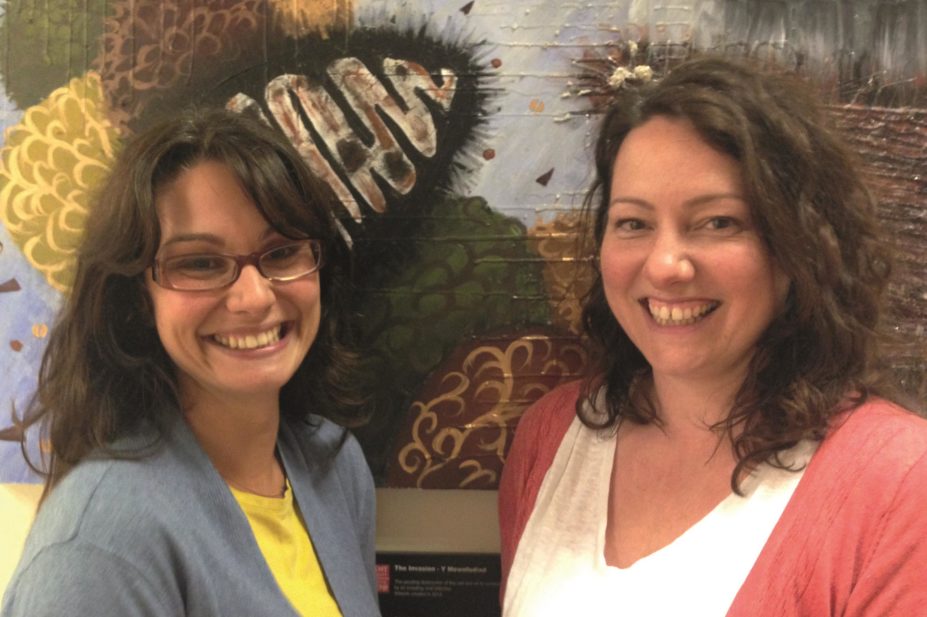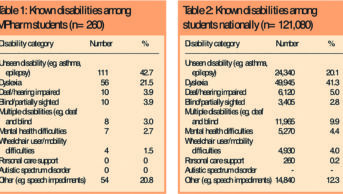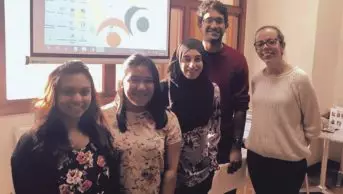
Pharmacy students at Cardiff University are undertaking placements at mother and toddler groups, healthcare charities and in other non-traditional pharmacy environments. Efi Mantzourani, leader of undergraduate placement-based learning, and Louise Hughes, who both lecture in pharmacy practice at the university, describe the benefits of the programme.
What is the role-emerging placements programme?
Role-emerging placements (REPs) are defined as professional placements outside traditional workplace environments, where a pharmacist is not routinely employed or involved. Within the Cardiff MPharm we have introduced a number of these focused placements over the past two years. In addition to traditional placements in community and hospital pharmacy, students in all years now engage with a range of individuals in non-pharmacy environments, including mother and toddler groups and weekly meetings for elderly people, and work with health charity support workers and alcohol misuse teams.
Where healthcare professionals are present and have been involved in the development of the scheme, they directly supervise students during their visit. Students also have access to a supervisor based at the university. Where health professionals are not normally present, such as in a mother and toddler group, a university staff member acts as the direct supervisor on-site.
Students are prepared through pre-placement tutorials discussing expectations and logistics. After the placement, students are encouraged to reflect on their experience in a workshop led by academic staff.
Why did you decide to initiate such a programme?
Exposing undergraduate students to practice environments is vital to their professional development but there are challenges related to traditional pharmacy placements. In particular, students in early years of the course may have limited opportunities for direct patient contact.
Research from education of other healthcare professions, in particular occupational therapy[1]
,[2]
, has suggested that REPs are beneficial to expanding the students’ understanding of the challenges around patient care and the importance of the multidisciplinary team. Nevertheless, within the UK, formal REPs in pharmacy education are a new concept.
How did you initiate the programme?
We reviewed the literature related to evaluation of REPs to identify main factors contributing to successful experiences. However, the limited studies related to pharmacy undergraduates referred to placements in Canada, of several weeks’ duration[3]
,[4]
. Such extended placements were not feasible within the MPharm curriculum.
As a starting point, we decided to run a small-scale pilot REP programme, involving a selection of first-year students on a voluntary basis and two elderly-care providers (Age Concern’s Ageing Well programme weekly meetings and three local day hospitals).
The pilot involved 59 students and feedback was positive from both students and providers. Further improvements were suggested and adopted for the following academic year.
What benefits does the programme have?
Students reported increased understanding of patient perceptions and subsequent impact on pharmaceutical care, as well as improved empathy and communication skills. Understanding medicines-related problems from the service users’ perspectives helped students to recognise the value of a more holistic approach to pharmaceutical care. In addition, students experienced first-hand how carers support elderly patients and recognised their important role.
During their placements, students had the opportunity to interact with a range of healthcare professionals and discussed with patients how each professional contributed to their care, leading to an increased awareness of the importance of multidisciplinary communication and coordination.
For the day hospitals, all supervising nurses shared their knowledge, experience and assessment skills with the students. The nurses also found it useful to find out more about how pharmacy students are educated to identify differences with nursing or medicine.
An unexpected benefit was that students began to recognise and develop their professional identity, something that we usually find challenging to achieve within the curriculum, especially at an early stage of their degree. Students also reflected on potential ethical and moral dilemmas in relation to their code of conduct.
How has the programme been evaluated?
Participating students were invited to complete an online survey, the results of which informed the development of a focus-group schedule. Twelve students then participated in two focus groups to expand on their reflections and discuss suggestions for further development of the programme.
All five placement supervisors participated in individual semi-structured face-to-face interviews to discuss their experiences of the placements and potential improvements to the scheme from their perspective.
Although service users were not included in the full evaluation, anecdotal feedback is positive. Relatives of the patients at the day hospitals said that they felt respected and listened to by the students. We also have an email from a grandparent in a mother and toddler group, expressing his satisfaction with the placement and his gratitude for enabling him to speak with a healthcare student in an informal environment.
References
[1] Overton A, Clark MJ & Thomas Y. A review of non-traditional occupational therapy practice placement education: a focus on role-emerging and project placements. British Journal of Occupational Therapy 2009;72(7):294–301.
[2] Clarke C, de-Visser R, Martin M et al. Role-emerging placements: a useful model for occupational therapy practice education? A review of the literature. International Journal of Practice-based Learning in Health and Social Care 2014;2(2):14–26. doi:10.11120/pblh.2014.00020
[3] Kassam R, Kwong M & Collins JB. Role-emergent model: an effective strategy to address clinical placement shortages. Internet Journal of Allied Health Sciences and Practice 2013;11(4).
[4] Kassam R, Kwong M & Collins JB. A demonstration study comparing “role-emergent” versus “role-established” pharmacy clinical placement experiences in long-term care facilities. BMC Medical Education, 2013;13:104. doi:10.1186/1472-6920-13-104

